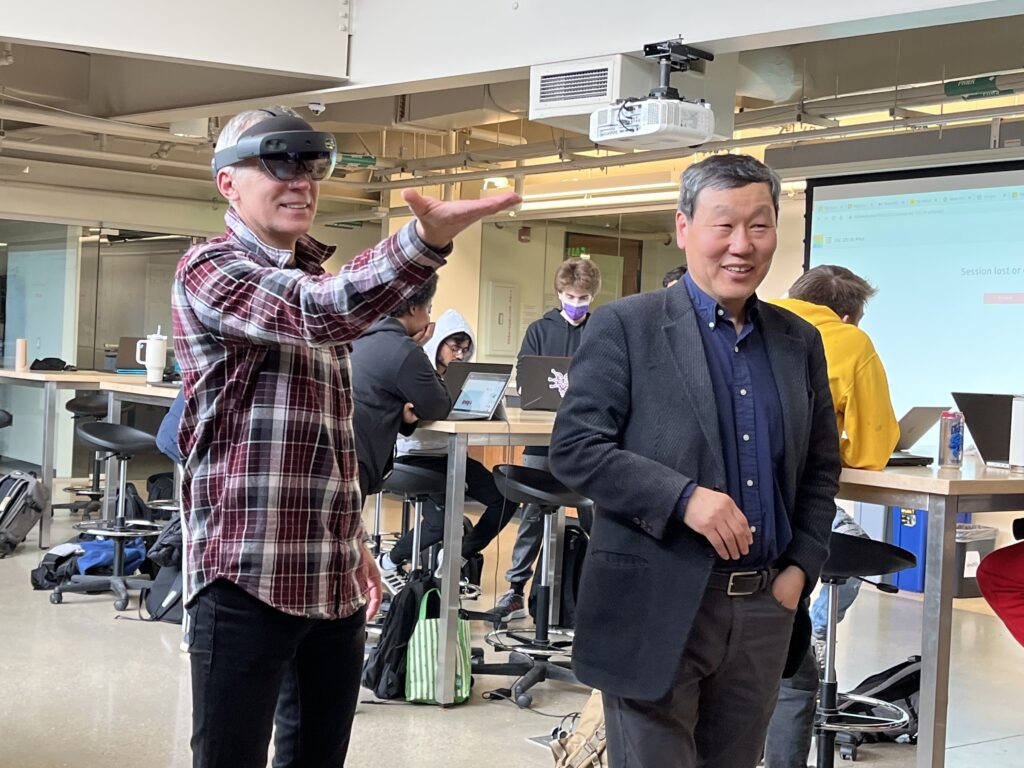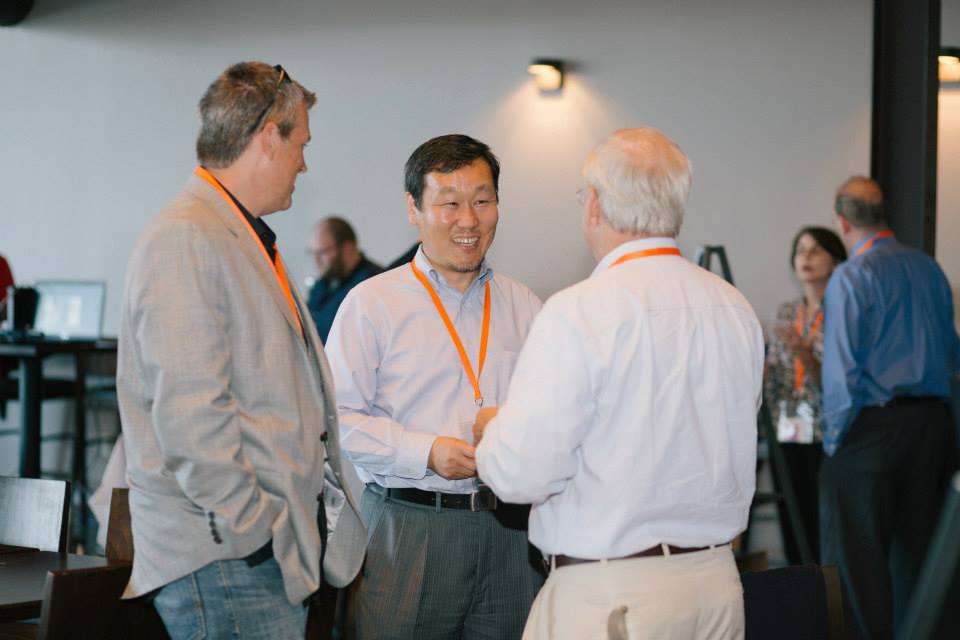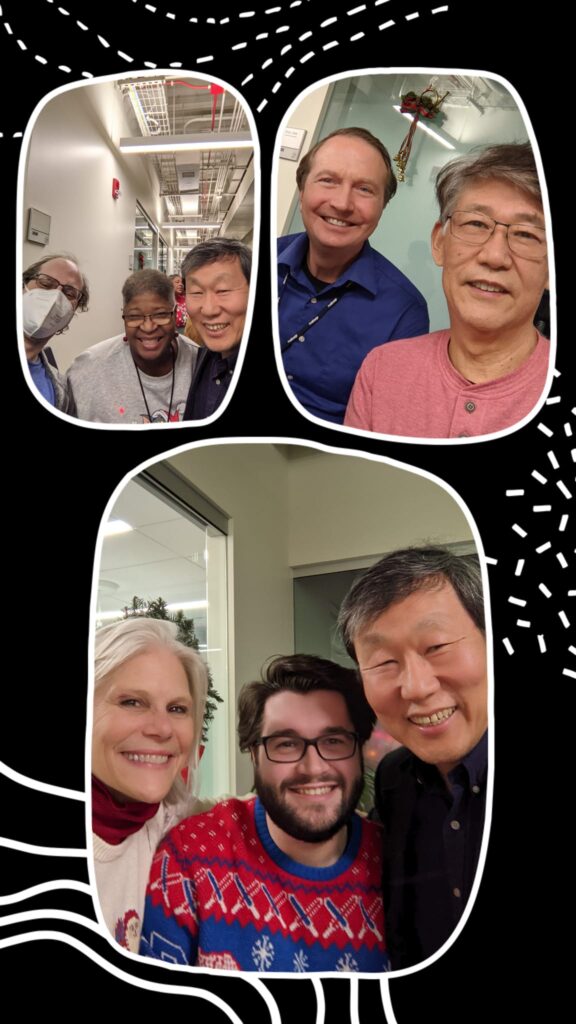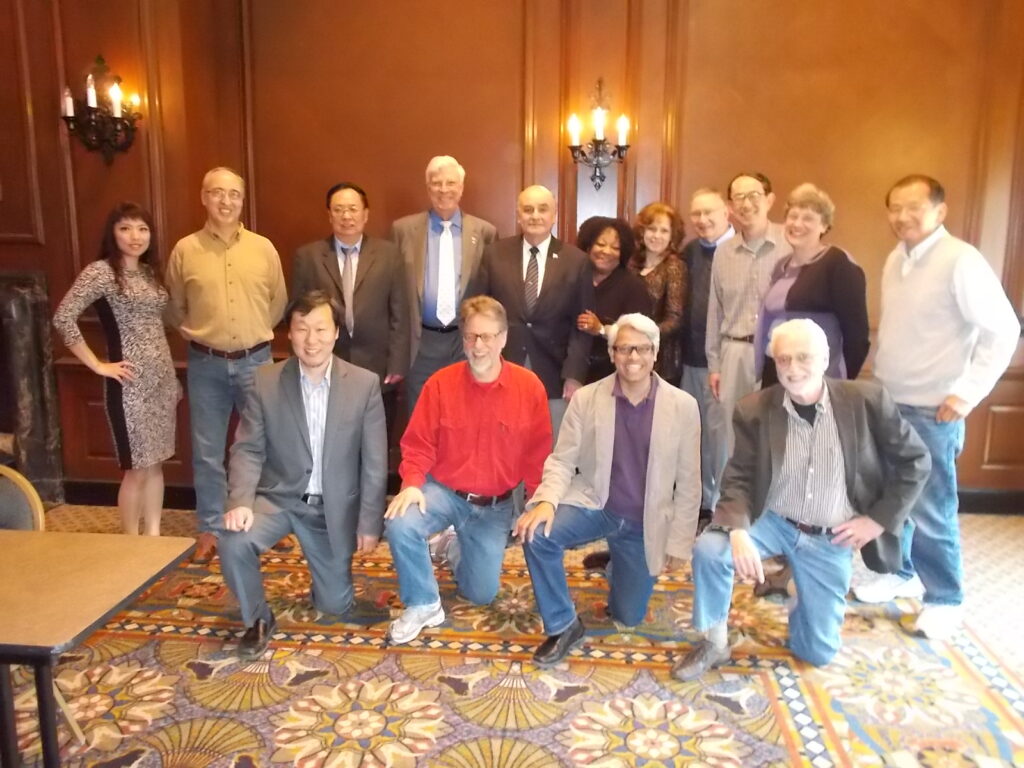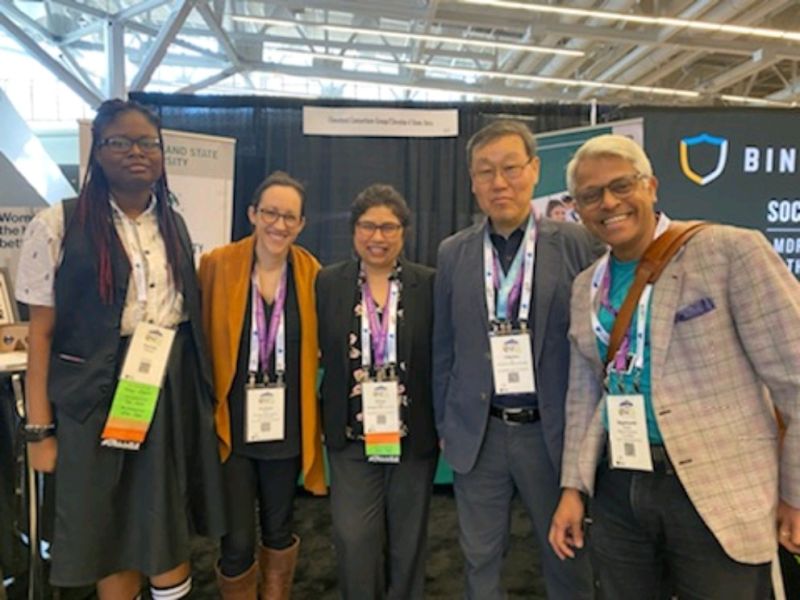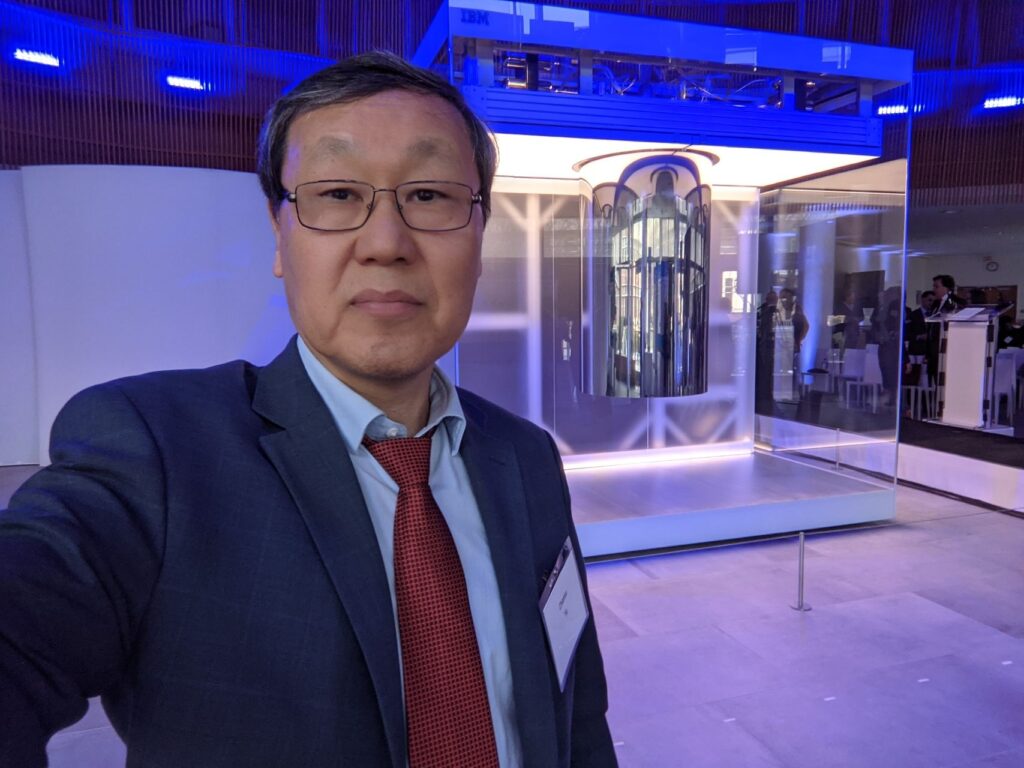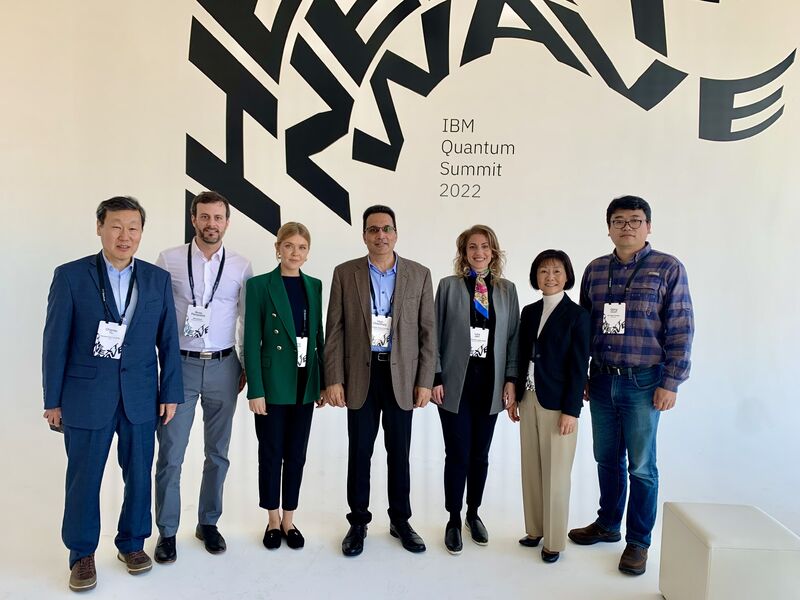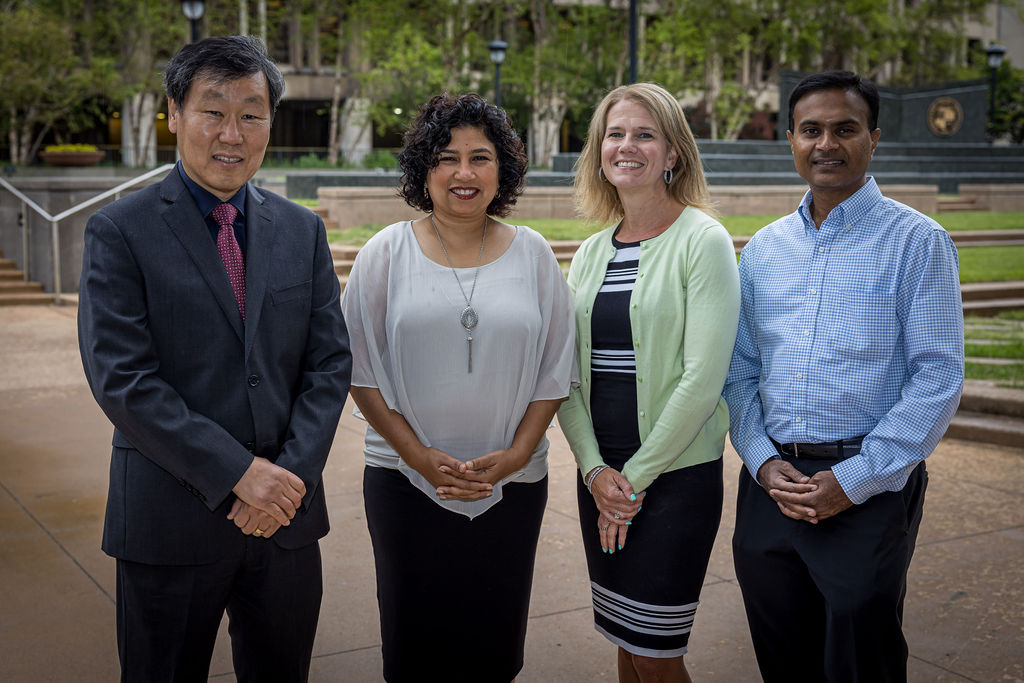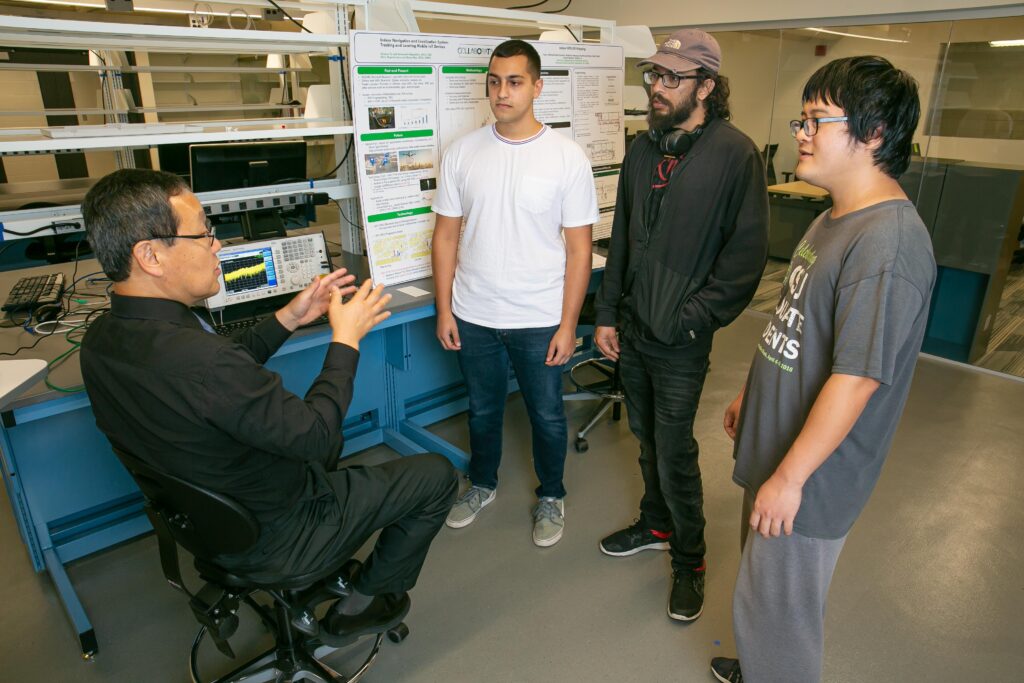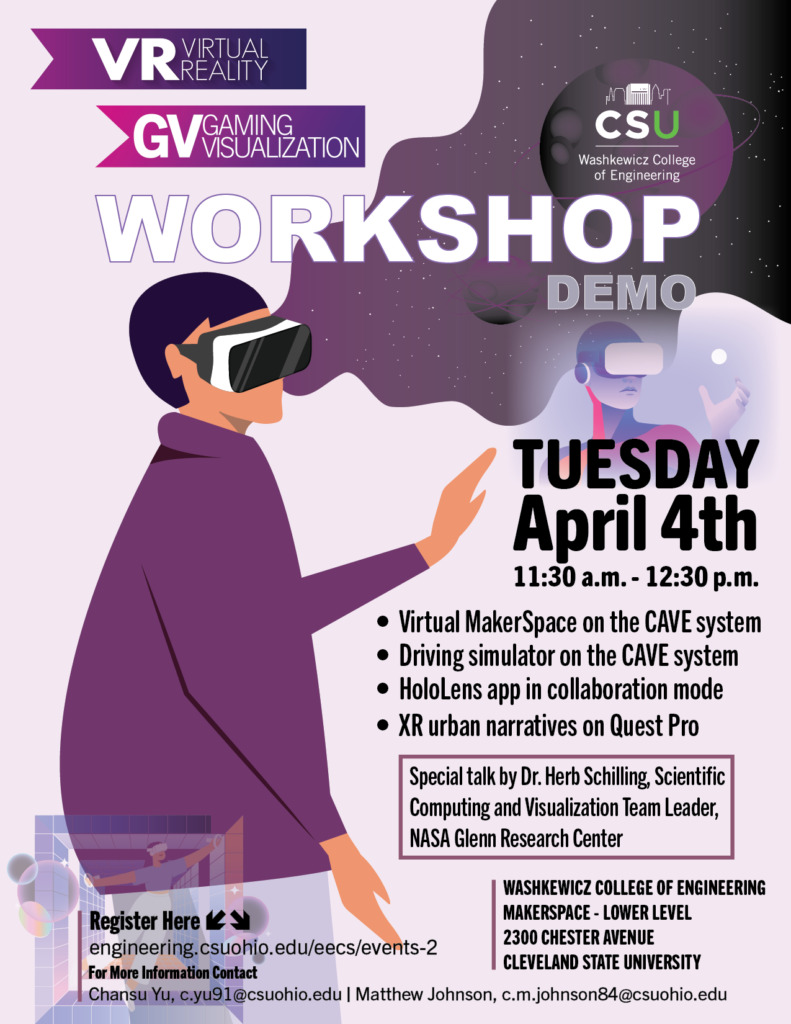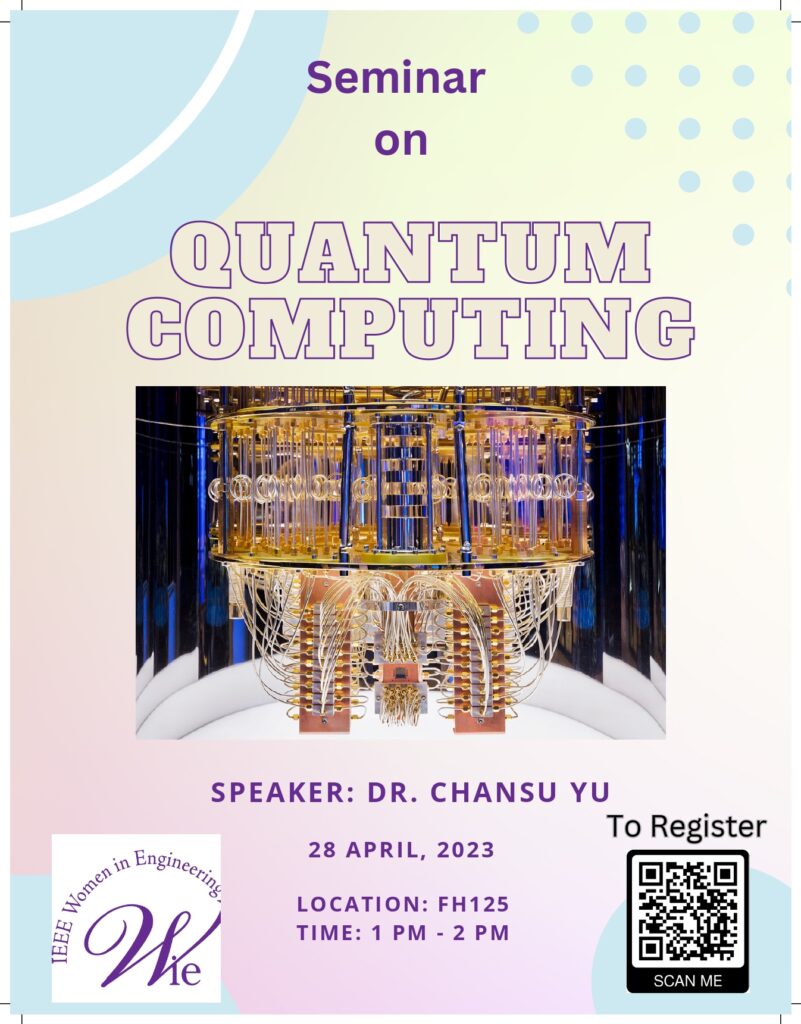Chansu Yu
Professor
Department of Electrical and Computer Engineering
Cleveland State University
Director, Mobile Computing Research Laboratory
Co-Director, CSU T.E.C.H. Hub
Coordinator, Quantum Computing Research Group
Faculty advisor, CSU-Cleveland Clinic IBM Quantum (CSU internal)
Steering committee, Applied Data Science, a joint PhD Program with Cleveland Clinic
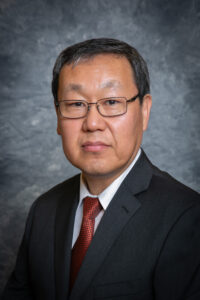
Summary
- 10+ years of industry experience (LG Electronics) and 20+ years in academia
- Leadership role at Cleveland State University (CSU) – Chair of Department of Electrical Engineering and Computer Science (Fall 13-Spring 20); CSU 2.0 Task Force (Fall 20 – Spring 21); Cleveland Innovation District ($200M, Spring 21-current); Co-director, CSU T.E.C.H. Hub (Fall 2022-current)
- Academic initiatives at CSU – Developed BS in Data Science (Fall 21-Spring 22); Developed Applied Data Science, a joint PhD program with Cleveland Clinic (Fall 21-Spring 22); Coordinating the Quantum Computing program (with Cleveland Clinic/IBM, Spring 22-current); Coordinator of the Virtual Reality facility and program (with NASA and School of Media Arts and Film, Fall 20-current)
- Regional activities – Regional Leadership Board, Greater Cleveland Partnership (GCP) RITE (Fall 20-current); Mentor, Global Cleveland (Fall 22-current)
- State/national-level activities – Chair, Computer Science Endorsement Standard Revision Committee, Ohio Department of Higher Education (ODHE) (Fall 21); Chair, State Faculty Panel, CS Endorsement Programs, ODHE (Fall 20-current); National Center for Women & IT (NCWIT) (Summer 20-current)
- Active grants of $4M including three NSF grants (Cybersecurity education, $400K, PI; CS for K-12, $2M, co-PI; Inter-state (seven universities) effort on CS education, $640K, co-PI), two PIT-UN grants (Data privacy and equity & Quantum pipeline), and an OCRI Center award (Ohio Cyber Range Regional Programming Center)
- Diversity, equity, and inclusion – Both the NSF grant (CS education for K-12) and PIT-UN grant (Quantum pipeline) aiming at engaging with CMSD (Cleveland Metropolitan School District) students, more than three quarters of whom are Black/Hispanic and economically disadvantaged; GCP RITE and its Workforce Connect IT Sector Partnership focusing on addressing racial, gender and geographic disparities; Helped organizing the WiCyS (Women in Cybersecurity) conference through CSU T.E.C.H. Hub in March 2022 in Cleveland, OH; Helping emerging leaders, mostly from overseas, as a mentor for Global Cleveland; Faculty advisor of a Senior capstone project which features Hough riots and neighborhood using virtual reality devices in collaborated with the School of Media Arts and Film at CSU and GCUFF, Greater Cleveland Urban Film Festival
Research
My research interests include:
- quantum computing
- cybersecurity challenge platform
- website fingerprinting attack
- hardware security such as fault injection attack and Meltdown & Spectre
- mobile networks and computing
- IIoT (Industrial IoT) and Smart manufacturing
- Public interest technology
- CS/CT (computer science / computational thinking) education
My on-going projects are:
- CS Education; Public Interest Technology
- Quantum computing – QAOA, PQC, Noise model, Distributed quantum architecture
- Cybersecurity Challenge Platforms
- Hardware security (Fault injection attacks, Meltdown & Spectre)
- Website fingerpriting attacks and defenses
- Mobile networking (Secure Wi-Fi, Indoor localization, Mobile hotspot)
- Software defined radio & Wireless steganography
I lead the Mobile Computing Research Laboratory (MCRL) at Cleveland State.
Research Highlights:
- We are currently supported by the grant award from the National Science Foundation (NSF) on our research work on cybersecurity challenge platform. This will be used to train future cybersecurity professionals in both the technical hands-on IT skills and the legal and policy and legal issues. Cybersecurity scenarios we implement and investigate include EternalBlue ransomware attack, Meltdown, #OpJustina DDoS attack, and Hacking group Thallium. (NSF; May 2021 – April 2025; 400K)
- We are currently supported by the grant award from the NSF to develop CS pathways as a part of the nation-wide CSforAll initiative. The Cleveland Tech Talent Pipeline is a Research-Practitioner Partnership (RPP) that will build upon several NSF-supported efforts in Cleveland to develop pathways for students in computer science and information technology from high school to career, community college and/or four-year colleges and universities. (NSF; November 2020 – October 2025; $2M)
- We recently received the grant award from the NSF to develop the SEI (Scaling, Expanding and Iterating) ITEST program, LEGACY++. Seven universities across four states (AL, MS, OH and MI) are partner with local industries (Mercedes Benz [AL], C Spire [MS], and the Cleveland Clinic [OH]) to promote students’ computational thinking skills and knowledge of CS workforce needs by collaborating on coding projects on topics that are pertinent to these industries. (NSF, May 2024 – April 2028, 640K)
- We submitted two NSF project proposals on quantum computing, Quantum Computational Toolbox for Life (NQVL program) and Robust Quantum Computing Through Integrated Data Engineering and Error Correction (ExpandQISE program), both of which are in collaboration with the Cleveland Clinic.
- Our paper, entitled Experience in Teaching Quantum Computing with Hands-on Programming Labs, has been published in Journal of Supercomputing, 2024. (Available from: https://rdcu.be/dBojs) An earlier version of the paper has been presented at the International Conference on Computational Science and Computational Intelligence, December 2023. (Available from: https://arxiv.org/abs/2308.14002v2)
- Our paper, entitled Tail Time Defense Against Website Fingerprinting Attacks, has been published in IEEE Access, 2022 (DOI: 10.1109/ACCESS. 2022.3146236) An earlier version of the paper was presented at the Nineteenth International Conference on Networks (ICN 2020), Lisbon, Portugal, in February, 2020. Website fingerprinting attacks are an Internet censorship technology and many attack and defense mechanisms have been proposed in the literature. The proposed defense algorithm maintains the high defense performance while reducing the page loading time, which has been identified as the weakness in previous mechanisms.
- Our paper, entitled Task, Knowledge, Skill, and Ability: Equipping the Small-Medium Businesses Cybersecurity Workforce, has been presented at the ASEE Annual Conference & Exposition in June 2024. See this. This is based on a MS Thesis.
- Our paper, entitled Towards Low-Barrier Cybersecurity Research and Education for Industrial Control Systems, has been presented at the IEEE International Conference on Intelligence and Security Informatics (IEEE ISI 2023) in October 2023. See this.
Publications
My complete list of publications
Recent publications and preprints:
- C McGuan, C Yu, K Suh, Practical and Lightweight Defense Against Website Fingerprinting, COMCOM (under minor review)
- Federico Galetto, Hiram H. Lopez, Mehdi Rahmati, Janche Sang, Chansu Yu, Experience in Teaching Quantum Computing with Hands-on Programming Labs, Journal of Supercomputing.
- Aadithyan Vijaya Raghavan and Chansu Yu, Task, Knowledge, Skill, and Ability: Equipping the Small-Medium Businesses Cybersecurity Workforce, 2024 ASEE Annual Conference & Exposition, June 2024.
- C McGuan, C Yu, Q Lin, Towards Low-Barrier Cybersecurity Research and Education for Industrial Control Systems, IEEE Intelligence and Security Informatics (ISI), October 2023.
- J. Sang and C. Yu, Hands-on Quantum Programming Labs for Beginners, International Conference on Computational Science and Computational Intelligence, December 13-15, 2023.
- J Liang, C Yu, K Suh, H Han, Tail Time Defense Against Website Fingerprinting Attacks, IEEE Access, Vol. 10, 2022, pp. 18516-18525
- J Liang, C Yu, K Suh, Delay-Conscious Defense Against Fingerprinting Attacks, The Nineteenth International Conference on Networks (ICN 2020), Lisbon, Portugal, February 24, 2020.
- Chu, P., Hamlen, K. R. and Yu, C., A Simple SoC Platform for the Integrated Computer Engineering Lab Framework, 2018 ASEE conference, June 24-27, 2018.
- S. Jeon, Y-J Suh, C. Yu, Pre-shared Key Agreement for Secure Public Wi-Fi, arXiv preprint arXiv:1711.02293, 2017.
- S. Jeon, J-P Jeong, Y-J Suh, C. Yu, D. Han, Selective AP Probing for Indoor Positioning in a Large and AP-Dense Environment, Journal of Network and Computer Applications, 2017.
- D. Bakunas-Milanowski, V. Rego, J. Sang, and C. Yu, Efficient Algorithms for Stream Compaction on GPUs, International Journal of Networking and Computing, Vol 7, No 2, 2017.
- Chu, P. P., Yu, C., and Hamlen-Mansour, K. R., A spiral computer engineering lab framework. AAAS/NSF Envisioning the Future of Undergraduate STEM Education: Research and Practice Symposium (EnFUSE), 2016.
- Rego, V., Sang, J., and Yu, C., A Fast Hybrid Approach for Stream Compaction on GPUs. International Workshop on GPU Computing and Applications, 2016.
- Bakunas-Milanowski, D., Rego, V., Sang, J., and Yu, C., A Fast Parallel Selection Algorithm on GPUs. International Symposium on Parallel and Distributed Computing and Computational Science, 2015.
- Bakunas-Milanowski, D., Rego, V., Sang, J., and Yu, C., An Improved Implementation of Parallel Selection on GPUs. International Symposium on Software Engineering and Applications, 2015.
- S. Bak, K.-H. Jung, C. Yu and Y.-J. Suh, Guided Tour of Handoff Steering for Bandwidth in Indoor Venues, IEEE WCNC, 2015
- Y. Qi, C. Yu, Y.-J. Suhand S. Y. Jang, GPS Tethering for Energy Conservation, IEEE WCNC, 2015
- K.-H. Jung, Y. Qi, C. Yu and Y.-J. Suh, Energy Efficient Wifi Tethering on a Smartphone, IEEE INFOCOM, Toronto, Canada, April 2014.
Funded Projects
Externally funded projects in recent years:
- Creating a Lasting LEGACY – Scaling a Peer-learning Community Model to Provide AP CS Preparation and Career Awareness for Black Young Women, National Science Foundation, May 2024 ~ April 2028, $640K among a total of $3M (co-PI, Collaborators: Jeffrey G Gray, University of Alabama Tuscaloosa (AL), Rebecca Odom-Bartel, CSU (OH), Mohammed A Qazi & Yasmeen Rawajfih, Tuskegee University (AL), Martha Escobar, Oakland University (MI), Jacqueline M Jackson & Deidre L Wheaton, Jackson State University (MS), Shelly R Hollis, Mississippi State University (MS), and Rajeev Swami & Emdad Ahmed, Central State University (OH))
- The PIT Quantum Computing Training Pipeline, PIT-UN (Public Interest Technology University Network) Challenge Grant, January 10, 2023 – January 8, 2024, $180K (co-PI, Collaborators: Charles McElroy and Sathish Kumar)
- Smart Cities Privacy & Equity Community Awareness & Empowerment, PIT-UN Challenge Grant, January 10, 2022 – January 8, 2023, $180K (co-PI, Collaborators: Brian Ray and Patricia Stoddard Dare)
- Ohio Cyber Range Regional Programming Center (OCRI-RPC), Ohio Cyber Range Institute, August 1, 2021 – July 31, 2022 (co-PI, Collaborator: Brian Ray and Sathish Kumar)
- Transdisciplinary Cybersecurity Education for Law and Engineering Students, National Science Foundation, May 2021 ~ April 2024 (PI, Collaborators: Brian Ray, Sathish Kumar and Debbie Jackson)
- Developing an Individualized, Integrative, and Progressive Electronics Laboratory Course, Ohio Space Grant Consortium, January 2021 ~ October 2021 (PI)
- The Cleveland Tech Talent Pipeline (CLE TTP), National Science Foundation, November 2020 ~ October 2024, $2M (co-PI, Collaborators: Debbie Jackson and Brian Harper)
- A Spiral Computer Engineering Lab Framework, National Science Foundation, July 1, 2015 ~ June 30 2019, (co-PI, Collaborators: Pong Chu and Karla Mansour)
- An Integrative Hands-on Approach to Security Education for Undergraduate Students, National Science Foundation, September 2013 ~ August 2018 (Collaborators: Dr. Sanchita Mal-Sarkar at CIS and Dr. Bhunia Swarup at CWRU)
- Acquisition of a 4G/LTE Wireless Communications Test Set, National Science Foundation, October 2013 ~ September 2017 (co-PI, Collaborators: Ye Zhu and Fuqin Xiong at ECE, Haodong Wang at CIS, and Miron Kaufman at Physics)
- Mobility and Security Support in Cyber Physical Systems, Electronics and Telecommunications Research Institute, July 2010 ~ January 2015
Teaching
- CIS 492/592 Quantum Computing
- EEC 380 Digital Systems
- EEC 483 Computer Organization Course, EEC 485 High Performance Computer Architecture, CIS 480 Computer Architecture
- EEC 581 Computer Architecture, CIS 580 Computer Architecture, CIS 600 Advanced Computer Architecture
- EEC 492 Hands-on Experience on Computer System Security
- EEC 492 Software Define Radio
- EEC 685/785 Modeling and Performance Evaluation of Computer Systems
- EEC 687/787 Mobile Computing
Lab info
Recent and current students:
- Komala M. Mandapati, Building Comptency in Cybersecurity: Leveraging KSA’s, Virtual Machine Labs, and NICE Framework to Foster Skill Development, MS Thesis, 2024
- Aadithyan Raghavan, Knowledge, Skill, and Ability: Equipping the Small-Medium Businesses Cybersecurity Workforce, MS Thesis, 2023 (first employment: Ford Motor Co.)
- Colman McGuan, Practical and Lightweight Defense Against Website Fingerprinting, MS Thesis, 2022 (code – BRO, Tail-time and Walkie Talkie, Tor cell capture) (first employment: Pressco Technolgy Inc.)
- Jingyuan Liang, Tail Time Defense Against Website Fingerprinting Attacks, PhD candidate, (first employment: Google)
Short Bio
Prof. Chansu Yu received the B.S. and M.S. degrees in electrical engineering from Seoul National University, S. Korea and the Ph.D. degree in computer engineering from the Pennsylvania State University in 1994. He had been with LG Electronics for more than ten years. He was an Associate Professor at the Information and Communications University (now KAIST) in S. Korea between 1997 and 2001. He is currently a Professor in the Department of Electrical and Computer Engineering at the Cleveland State University in Cleveland, Ohio. He was also a Distinguished Professor at POSTECH, S. Korea between 2009 and 2013. He has authored/coauthored more than 120 technical papers and numerous book chapters in the areas of Computer Science & Data Science Education, Public Interest Technology, Cybersecurity, Hardware Security, Quantum Computing, Mobile Computing, and Parallel Computing. Dr. Yu’s research is supported by National Science Foundation and other government agencies and industry. Dr. Yu is a senior member of the ACM, ACM CSE, IEEE and IEEE Computer Society.
in action
